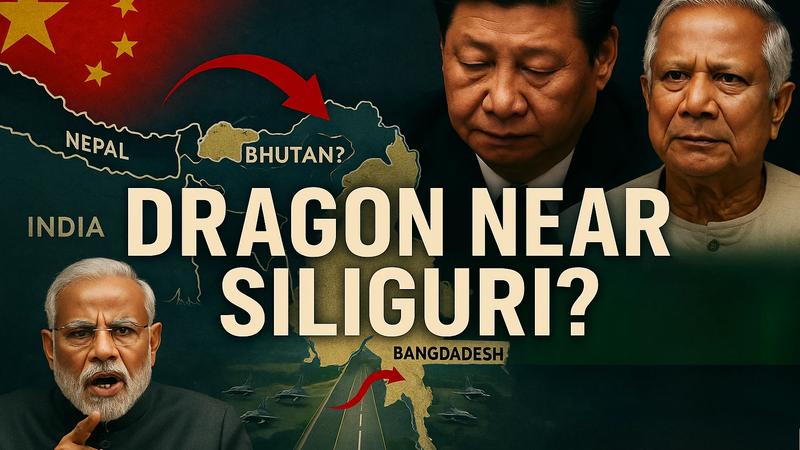China is Near Siliguri Corridor | Something Big will happen in Bangladesh soon

In the next one to two years, a major geopolitical flashpoint is likely to erupt around the Siliguri Corridor, the lifeline that connects mainland India to the Northeast. Recent developments paint a very clear pattern — one that India cannot afford to ignore any longer.
Let’s connect the dots.
First, India conducted a strategic military exercise named Teesta Prahar — not near, but right inside the Siliguri Corridor. This wasn’t a random drill; it was a clear signal that the Indian armed forces are fully aware of this area’s vulnerability and strategic importance.
Soon after, India abruptly halted textile trade with Bangladesh, sending ripples through cross-border economic relations. And just when the dust had not yet settled, another worrying development emerged — one that should grab every Indian’s attention.
Source of image : Times Of India
China Moves Closer: A World War II Airbase Being Revived
Multiple Indian media outlets have now confirmed that Chinese officials have reached Bangladesh’s Lalmonirhat airbase, a relic from World War II, located just 12-15 km from our border. Reports suggest they are surveying it with the intention to revive and modernize it, similar to how the British used it back in 1931. There are strong indications that this base could potentially host JF-17 Thunder aircraft in the future, as part of China’s long-term military partnership with Bangladesh.
Let that sink in — an airbase, nearly at our doorstep, being developed with Chinese support.
This isn't speculation anymore. It’s happening. And if India doesn’t act now, this could very well be a major thorn in our security setup.
China’s Pawn: Bangladesh’s Increasing Dependence
While China is calling the shots, Bangladesh is slowly becoming a pawn in this new-age Cold War. And so called advisor of interim government of Bangladesh, Mohammad Yunus has repeatedly invited Chinese involvement — be it in the Teesta River project or this airbase revival.
Why is Bangladesh doing this? One word — desperation.
Like Pakistan, Bangladesh is economically fragile and looking for lifelines. China offers loans, infrastructure, and political backing — not out of goodwill, but with a clear price tag. Control. Influence. Leverage.
And China never helps for free. History has shown us that time and again.
Warnings From the West: NATO Veterans Speak Out
Even ex-NATO intelligence officials from Turkey are sounding the alarm. A prominent Turkish-German strategist recently stated that China will build a fully operational airbase in Lalmonirhat, and Pakistan may act as a subcontractor in its construction.
His final warning was chilling:
“India is increasingly surrounded and starting to be squeezed.”
When ex-NATO strategists can see it clearly, why aren’t we acting more decisively?
Turkey’s Hidden Hand: Ideological Infiltration and “Greater Bangladesh”
You may wonder — what role does Turkey have to play in all this?
Turns out, a very dangerous one.
Turkey has long wanted to export its radical ideology to South Asia, and Bangladesh is a perfect breeding ground. Turkish-backed NGOs are subtly introducing the concept of a “Greater Bangladesh”, not in remote villages, but in elite institutions like Dhaka University — where future policymakers and military officers are being indoctrinated.
Turkey’s goal is to instill in Bangladesh a sense of expansionist nationalism, painting India as the enemy. And Turkey isn’t even hiding it anymore. Their Trade Minister openly said that Turkey is ready to replace India as Bangladesh’s primary trade partner. The message is clear — India is being pushed out.
The Chessboard: Bangladesh and Pakistan are Pawns. China Holds the Queen
Let’s be honest — Bangladesh is not the mastermind here. China is.
Bangladesh is being offered dreams of development, influence, and strategic relevance. But behind the curtain, Beijing is writing the script, and Turkey is helping direct the play.
Pakistan? They’re just the subcontractor, as usual — executing what China can't do openly. A well-rehearsed three-pronged strategy is now active:
- Pakistan – for proxy support and intelligence.
- Bangladesh – for geographic advantage and airspace control.
- Turkey – for ideological warfare and PR cover.
And India? We're boxed in.
India Must Wake Up: It’s Time for Bold Moves
For too long, India has played defense. We have been ultra-cautious with China, hesitant to poke the dragon. But the time for restraint is over. The stakes are too high.
We must act on multiple fronts:
- Forge stronger ties with Taiwan, Japan, and ASEAN nations. Bold diplomatic moves are overdue.
- Ramp up our presence in international media. The global narrative is slipping away from us.
- Counter Chinese and Turkish propaganda. Their writers, influencers, and media houses are damaging India’s image in global discourse.
- Reinvest in strategic partnerships with Bangladesh. Offer economic, technological, and educational support — not just criticism.
We cannot afford to lose Bangladesh. Not geographically. Not ideologically. And certainly not militarily.
Conclusion: India Must Think Like a Grandmaster
This is no longer just diplomacy. It’s a geopolitical chess match.
And China is playing to win.
The Siliguri Corridor is our queen’s gambit. Lose it, and we risk being checkmated in our own neighborhood.
Bangladesh, Pakistan, and Turkey may look like independent players, but they are just well-placed pawns.
The real player is China.
And India must rise to the challenge — not as a reactive force, but as a proactive power with vision, strength, and courage.